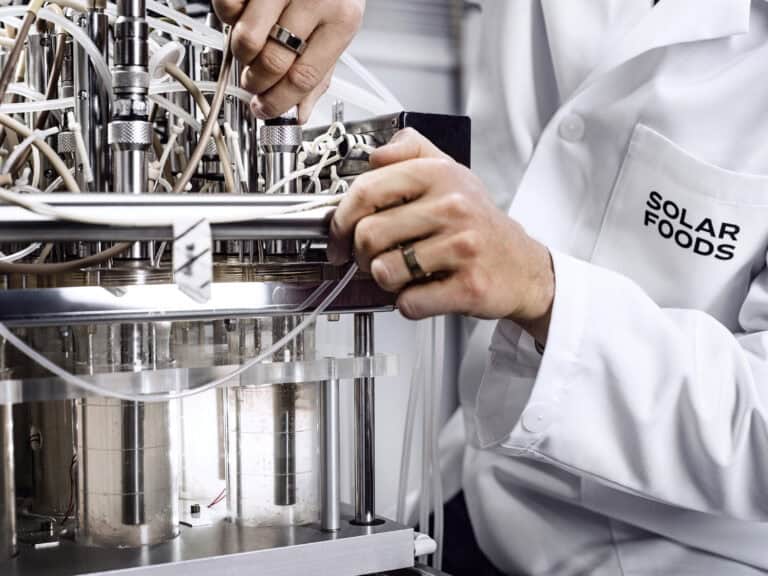EU Biotech Act Excludes Novel Foods From Regulatory Sandboxes in “Missed Opportunity”
The European Commission has published the new Biotech Act, which aims to boost the EU’s global competitiveness in biotechnology. The Act is mainly focused on the health sector, but also includes measures that could help commercialise the findings of European researchers working on techniques such as precision fermentation. Nonprofit think tank GFI Europe has welcomed parts of the Act, including plans to expand the advice regulators provide to innovators bringing …
New Roundtable Will Discuss Creation of a Pan-European Regulatory Sandbox for Food Biomanufacturing
Think-and-do tank the Ministry of Future Affairs is preparing to host a policy roundtable to discuss a brief titled Closing the European Food Innovation Gap! A Framework for a Pan-European Regulatory Sandbox for Emerging Foods. The event will take place at the European Parliament in Brussels on November 12 between 13:00 and 15:00. It will be hosted in collaboration with Future Affairs Consulting and Enterprise Estonia. The roundtable will feature …
EU Project FABULOSE Receives €3.5M to Develop Animal-Free Leather From Biotechnologically Produced Cellulose
A new innovation project called FABULOSE is set to receive €3.5 million from the EU to develop animal-free leather alternatives made from biotechnologically produced cellulose. 11 European partners are involved in the project, working to create scalable and sustainable bio-based production routes for animal-free leather. Novis BioBased Technology, a company specialising in biogas plants, and vegan handbag manufacturer MELINA BUCHER are also involved. Consulting and brokerage agency Steinbeis Europa Zentrum …
Umami Bioworks and Friends & Family Set to Pilot Cultivated Seafood Pet Food Across Europe and Asia
Umami Bioworks has announced a new partnership with Friends & Family Pet Food Company to launch cultivated pet food in select international markets. The collaboration will focus on introducing sustainable, high-quality protein sources for pets, with a particular emphasis on cultivated seafood. The initiative will pilot in Singapore, the United Kingdom, and the European Union. This partnership follows a recent milestone for Umami Bioworks, which has successfully registered two cultivated …
Austria Presents Petition to Ban Cultivated Meat at European Parliament
The Chambers of Agriculture of the Austrian states of Carinthia and Styria have presented a petition against cultivated meat at the European Parliament’s Petitions Committee. Called “Lab Meat? No, thank you!”, the petition has gained almost 70,000 signatures and was presented in person by Andreas Steinegger and Siegfried Huber, presidents of the agricultural chambers of Styria and Carinthia respectively. They claim that their intention is to protect farms and maintain …
European Parliament Report Acknowledges Strategic Importance of Biotechnology and Biomanufacturing
Yesterday, the European Parliament voted on a report on the future of the EU biotechnology and biomanufacturing sectors. The report acknowledges the importance of these sectors across various EU policy priorities, including sustainability, economic security, food security, and public health. It calls for targeted investments in strategic biotech applications, including food biotechnology, along with a policy framework to promote innovation, investment, and sustainable growth. According to the report, biotechnology and …
21st.BIO Engineers Safer Fungal Strain for Protein Production, Calls for EU Regulatory Reform
Biotech firm 21st.BIO has developed a new strain of Aspergillus oryzae, a filamentous fungus commonly used in fermentation, that has been engineered to remove all known pathways for producing mycotoxins — potentially harmful compounds sometimes found in fungi. The new strain, described in a peer-reviewed study published in Applied Microbiology and Biotechnology, was designed to avoid producing substances such as aflatoxins and other unwanted byproducts. It also eliminates the genes …
Solar Foods Edges Closer to Regulatory Approval for Air-Based Protein in the EU
Finland’s Solar Foods is moving closer to regulatory approval in the EU after addressing inquiries from the European Food Safety Authority (EFSA) regarding the safety of its air-based protein, Solein. The company submitted its novel food application back in 2021, providing a detailed dossier containing manufacturing data, product information, and supporting scientific evidence. Solein is currently undergoing a comprehensive application process to ensure it is safe for consumption, not misleadingly …
Mosa Meat Requests First EU Market Authorisation for Cultivated Fat
Netherlands-based cultivated beef producer Mosa Meat has submitted its first request for Novel Foods market approval in the EU, seeking authorisation for its cultivated fat ingredient. The fat is designed to be blended with plant-based ingredients to create beef-style products such as hamburgers, meatballs, and bolognese. Following the regulatory submission, the cultivated fat will be evaluated by The European Commission (EC) and the European Food Safety Authority (EFSA). The submission …
Impossible Foods Approaches EU Approval Following Second Positive EFSA Opinion
Impossible Foods has moved another step closer to selling its products in the EU after the European Food Safety Authority (EFSA) Panel on Genetically Modified Organisms ruled that its soy leghemoglobin (heme) is safe to eat. The heme is produced using a form of modified yeast, which is cultivated in tanks using precision fermentation. It enables Impossible Foods’ plant-based meat to “bleed” and provides a meaty taste. Impossible Foods initiated …










